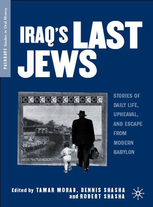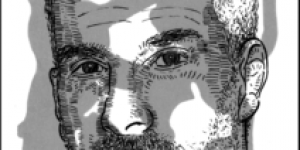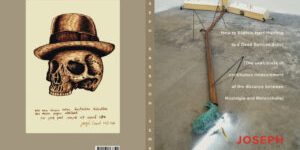Tamar Morad, Dennis Shasha & Robert Shasha ~ Iraq’s Last Jews: Stories Of Daily Life, Upheaval, And Escape From Modern Babylon
No Comments yet Palgrave Studies In Oral History- 2008 – Series Editors’ Foreword
Palgrave Studies In Oral History- 2008 – Series Editors’ Foreword
In another book in the Palgrave Studies in Oral History series, Soldiers and Citizens, an Assyrian Christian explains how his group in the Iraqi town of Dora was threatened with death if they didn’t convert to Islam or pay a special tax or abandon their homes and leave within 24 hours. He remarked, “I heard there was talk of doing to the Christians what they did to the Jewish in the 1940s.”1 The year 1941 witnessed the Farhoud, a Nazi-inspired pogrom, which began a series of events that propelled a Jewish exodus from Iraq. Of the approximately 137,000 who resided in Iraq during the early 1940s, 124,000 had fled, most to Israel, by 1952. The relatively few left behind suffered as a result of the Six Day War in 1967 when Iraq restricted their movement, jobs, and opportunity to communicate in and outside of the country. Some suffered imprisonment and torture. Hence, the once vital and vibrant Iraqi Jewish community had all but disappeared from its homeland by the 1970s. Oral histories have widely documented the Holocaust, but the stories recounted in this volume are less well-known and serve to expand our knowledge of Middle Eastern Jews outside of Israel. Oral history is particularly well suited to capture the drama and trials of this historical experience and to humanize the past condition of a community that exists in exile. With American attention focused upon Iraq as a consequence of two recent wars, public curiosity about that nation will benefit from these accounts. Iraq’s Last Jews joins a number of other volumes in this series that consider issues of world-historical significance. Whether it be the contemporary Iraq War or the decades-past Chinese Cultural Revolution, or any number of other topics, the series encourages the employment of oral history to investigate the memories of ordinary and extraordinary people in order to make sense of past and present.
Bruce M. Stave University of Connecticut – Linda Shopes Carlisle, Pennsylvania
Preface
Some 2,500 years after the first Jews established roots in Babylon, the once-vibrant and prosperous Jewish community of Iraq has disappeared. A community that numbered close to 140,000 in the late 1940s—and comprised fully one-third of Baghdad’s population—consisted of a mere 20 when U.S. tanks rolled into the Iraqi capital in 2003. Today, fewer than ten Jews remain in Iraq. Yet as late as the 1920s and 1930s, Iraqi Jews felt the heady potential of full equality in a secular society for the first time in their long history of subordination to Muslim rulers. From music to politics to commerce, Jews played a major role in Iraqi society and culture. For centuries after the destruction of the Second Temple in Jerusalem, Babylon was the world’s epicenter of Jewish life and religion—the place where the Babylonian Talmud was written and where rabbis from across the region and Europe came to learn from the most scholarly sages. But the community dissolved in the middle of the 20th century when pro-Nazi forces, Arab nationalism, and the formation of Israel led to violence against and a general sense of insecurity among Iraqi Jews, causing them to flee, mostly over the course of about a year and a half. This book tells the story of that last generation, people who in many cases grew up with strong patriotic feelings but were always prepared for a future beyond Iraq’s borders—just in case. The storytellers of these first-person accounts vary as widely as any group of Jews does, reflecting the breadth and texture of the community: wealthy businessmen and Communists, popular musicians and reformist writers, Iraqi patriots and early Zionists. Many had close friends among the Muslims and Christians of Iraq of whom they speak warmly. They tell the tales of a people with a love for their birth country that persisted even as they were forced to leave their homes. The story of the final decades of the Jewish community in Iraq divides into three periods. First is the period before 1939 when the Jews in Iraq saw themselves as part of the Iraqi national fiber in government, commerce, and the arts. That ended verbally with the rise of Nazi influences and violently with the Farhoud, a pogrom against the Jews, in 1941. Second is the period between then and 1953 when Arab hostility toward the new state of Israel turned most Jews into Zionists and the vast majority of the community left. The final period records an Iraq that drifted towards increasingly autocratic leadership, culminating in the sadistic dictatorship of Saddam Hussein, with the Jews often playing the role of scapegoat. Finally, the book closes with several moving retrospectives of the community. These stories are sometimes funny, often tragic, touching, and insightful. Readers will find that the editors, in addition to recording descriptions of daily life, have also uncovered acts of heroism, adventure, and intrigue: from the undercover Israeli agents who helped orchestrate the mass emigration of Iraqi Jews to the young Jewish state at mid-century, to those who argued for the lives of their loved ones in the brutal prisons of Saddam Hussein. What has been compiled here, ultimately, is a book about quiet bravery in times of distress and a celebration of the possibility of peace.
Copyright © Tamar Morad, Dennis Shasha, and Robert Shasha, 2008. All rights reserved. First published in 2008 by PALGRAVE MACMILLAN® in the United States—a division of St. Martin’s Press LLC, 175 Fifth Avenue, New York, NY 10010.
The complete book: https://epdf.pub/iraqs-last-jews-stories-of-daily-life-upheaval-and-escape-from-modern-babylon-pa.html
You May Also Like
Comments
Leave a Reply






